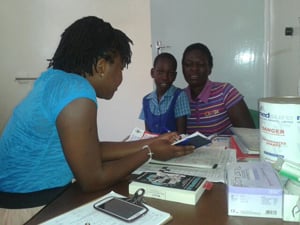The School’s Dr Rashida Ferrand and Dr Adam Kucharski have been awarded Engaging Science funding from the Wellcome Trust, highly competitive grants that will allow them to collaborate with young people and healthcare workers in innovate and creative ways.
Dr Ferrand’s International Engagement Award project, starting this September, is entitled “Breaking the silence: stories about HIV-infected adolescents in Zimbabwe”. There is a lack of awareness regarding the issues that these young people face as they grow up, and this research aims to better understand these challenges in order to develop interventions to help them.
The views of the young people and their carers are of paramount importance to this project, and the team will be using creative methodologies to ensure they are reflected. Digital storytelling workshops with caregivers and healthcare providers will document their experiences of looking after these children, and the young people themselves will work with a professional drama group to create a story about the challenges they face and their strategies for coping with the disease.
Dr Ferrand will be leading a multidisciplinary team of film-makers, digital storytellers, researchers, child protection professionals and healthcare workers to deliver this exciting work.
Dr Ferrand said: “This work will enable the voices of HIV-infected adolescents, their caregivers and their healthcare providers to be heard so they can be part of shaping the care provided.”
Dr Kucharski’s People Award, also starting this month, will provide UK school students with the opportunity to be collaborators in a real research project. Year 9–10 students (13-14 year olds) in four schools across the country will work with researchers to design and carry out a project to see how understanding social networks can shed light on how infectious diseases spread.
Studying social interactions is an increasingly important aspect of biomedical science, and the project will highlight strong links with other fields, including mathematics, sociology and medicine. Students will gain applied skills in study design, debating the ethics of data collection, and evaluating and presenting results.
Researchers at the School will also learn a great deal from their teenage collaborators. The structure of networks of social contacts is a key driver of infection, and school children are ideally placed to explore their own social networks and track their peers’ behaviour from within.
Dr Kucharski said: “This is a brilliant chance for school pupils to take a leading role in new scientific research. Although schools play an important role in disease outbreaks, there is still much we don’t know much about social networks in schools, particularly how they change over time. As well as giving pupils first-hand experience of being a scientist, the project has the potential to generate crucial insights into the social behaviour that shapes epidemics.”
Dr Kucharski has since posted an end-of-project blog about his experiences.
International Engagement and People Awards have several deadlines a year, and the Trust is always on the look-out for proposals that will engage non-academics in conversations about research using creative methodologies.
If you would like to discuss ideas for an application for a Wellcome Trust Engaging Science grant, please contact the School’s Public Engagement Co-ordinator: publicengagement@lshtm.ac.uk
Image: Research assistant giving a negative HIV result to a child, Zenith study. Credit: Grace McHugh
